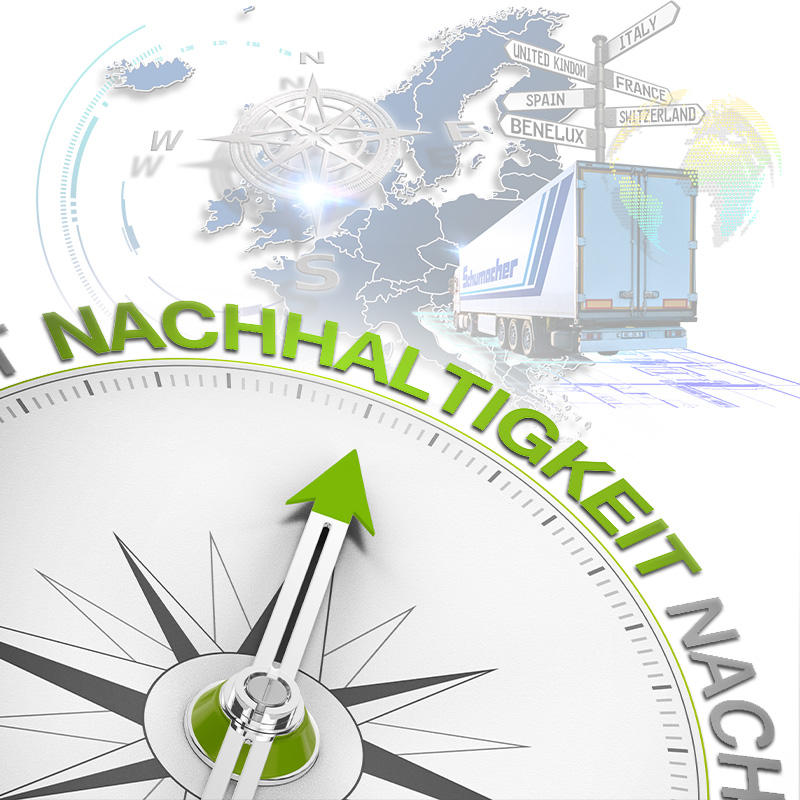Spedition Schumacher International GmbH – Ranking by EcoVadis

Ranking by EcoVadis - an important step into the future of logistics

This year, Spedition Schumacher International GmbH underwent a sustainability assessment by EcoVadis for the first time. EcoVadis is a globally recognized and renowned platform for trustworthy sustainability assessments for companies and is one of the leading and most trusted providers of sustainability assessments. EcoVadis is of great importance for both customers and suppliers. The company assesses the sustainability performance of various industries in four areas: labor and human rights, ethics, environment and sustainable procurement.
We are proud to have achieved 56 percent in our first sustainability ranking. This value shows that we are on the right track, but also that there is still room for improvement, which we would like to actively address.
The result of our EcoVadis assessment reflects our commitment to integrating sustainable practices into all areas of our business. It motivates us to continue making progress and seeking innovative solutions to achieve and exceed our sustainability goals.
The topic of sustainability in transport
The topic of sustainability is becoming increasingly important for freight forwarders, as it encompasses ecological, economic and social aspects that are crucial in the long term both for the environment and for the competitiveness and reputation of companies.
1. Ecological sustainability
- Reducing CO₂ emissions: We strive to minimize our CO₂ emissions by using more environmentally friendly modes of transport. Currently, only trucks that comply with the environmentally friendly Euro VI emissions standard are in use. In the future, we would like to switch to alternatives such as electric or hybrid vehicles and promote the use of renewable energies.
- Optimizing route planning: Efficient route planning and the use of telematics systems can reduce driving distances and idle times, which lowers fuel consumption and emissions.
- Alternative fuels: The use of biofuels, LNG (liquefied natural gas) or hydrogen as alternatives to diesel is becoming increasingly interesting.
2. Economic sustainability
- Cost reduction through increased efficiency: Sustainable practices such as optimizing logistics processes and using modern technologies can reduce operating costs.
- Long-term competitiveness: By investing in sustainability, we can assert ourselves in the market in the long term through a positive image and compliance with environmental standards.
- Risk management: Sustainability helps minimize risk by preparing us for future regulations and market changes.
3. Social sustainability
- Employee health and safety: Measures to reduce air pollution and noise pollution contribute to a healthier working environment. In addition, fair working conditions and the promotion of employee qualifications are important aspects.
- Focus on the common good: We are increasingly involved in social projects and initiatives that serve the common good.

4. Compliance and transparency
- Compliance with legal requirements: Stricter environmental requirements and regulations, both nationally and internationally, require sustainable practices to be implemented and reported regularly.
- Sustainability reports: We publish sustainability reports on our news page to make our environmental and social measures transparent and to strengthen the trust of customers and stakeholders.
5. Innovations and digitalization
- Smart Logistics: Digitalization enables us to plan and carry out transports more efficiently. We can plan ahead and thus reduce failures or react to changes in real time.
- Automation and networking: Automated and networked systems enable processes to be optimized and resources to be used more efficiently.
Sustainability in the freight forwarding industry is not just a trend, but a necessity to reduce the ecological footprint, lower operating costs and remain competitive in the long term. Our company invests in sustainable solutions and thus not only contributes to environmental protection, but also strengthens our market position and meets the growing expectations of our customers. For us, sustainability and taking responsibility have always been an integral part of Schumacher’s corporate practices.





